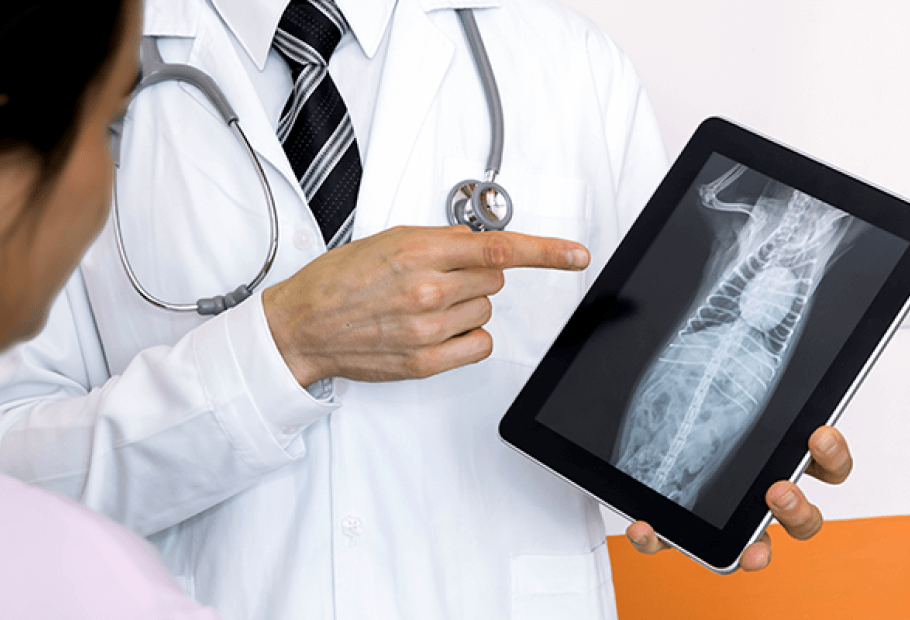
Diagnostics
Digital Radiography
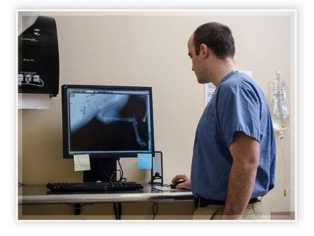 Radiographs (X-rays) are extremely helpful for diagnosing and monitoring many medical conditions, and are useful in examining your pet’s bones, lungs, heart, abdomen, oral cavity and other areas of the body. An X-ray can spot a fractured bone, detect tumors, help with the diagnosis of heartworm disease or locate an obstruction or foreign body in your pet’s intestine or stomach.
Radiographs (X-rays) are extremely helpful for diagnosing and monitoring many medical conditions, and are useful in examining your pet’s bones, lungs, heart, abdomen, oral cavity and other areas of the body. An X-ray can spot a fractured bone, detect tumors, help with the diagnosis of heartworm disease or locate an obstruction or foreign body in your pet’s intestine or stomach.
When used in conjunction with other diagnostic procedures like ultrasound, X-rays can accurately diagnose problems, making treatment faster and easier for your pet and your veterinarian. Digital radiography is a form of X-ray imaging that replaces traditional photographic film. Advantages include time efficiency through bypassing chemical processing and the ability to digitally enhance images. Less radiation is also used to produce an image of similar detail than that of conventional radiography, while reducing the time needed to take images of your pet.
In addition, our digital radiography system allows us to transfer your pet’s radiographs to a CD or sent in an email, making it easy for you to keep them for your home records. They are also safer for the environment.
Ultrasound Imaging
Ultrasound is a pain-free, completely non-invasive technique that uses high-frequency sound waves to produce a real-time moving image of your pet’s internal organs. This diagnostic procedure is particularly useful in viewing your pet’s abdominal organs including the spleen, kidneys, liver, and gallbladder. It can also be used to evaluate heart functions, do bladder scans and image other areas such as the thyroid gland, testicles and mammary glands.

The diagnostic tests we perform complement each other. For example, if an x-ray shows a lesion in your pet, an ultrasound may be able to determine the origin of the lesion and whether it has spread elsewhere in your pet’s body. Using the ultrasound image as a guide, surgical biopsies can be obtained without major surgery and your pet can often go home the same day. Ultrasound imaging can reveal cancer, heart lesions, enlarged spleens, and many other conditions. Ultrasounds are typically not stressful for your pet and take anywhere from 30 to 60 minutes to perform.
Computed Tomography (CT)
Computed Tomography or CT is another important imaging resource at the Plattsburgh Animal Hospital. Plattsburgh Animal Hospital offers a state-of-art, Samsung Neurological CereTom 8 slice CT scanner. This scanner is designed specifically with small animal patients in mind. The CereTom has the capability of scanning small patients quickly, with excellent image quality and minimum radiation exposure. Example: Scan time for location of an intervertebral disc extrusion is approximately 30 seconds! This CT scanner is quite extraordinary in that it is both portable and self-shielding, allowing us to perform CT scans anywhere in the hospital, including the operating room. Additionally, the CereTom has state-of-art 3D rendering of images, giving us an enormous amount of information for pre-surgical planning.
Electrocardiogram (EKG or ECG)
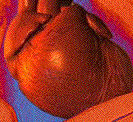
An electrocardiogram (ECG or EKG) is a recording of electrical activity of the heart. It is a safe, non-invasive procedure that uses clips (electrodes) placed on the skin over chest and legs. The ECG is used commonly to evaluate the heart rhythm and identify abnormalities (arrhythmias) in the heartbeat. It may also help to identify enlargement of the heart, a common finding with many heart diseases.

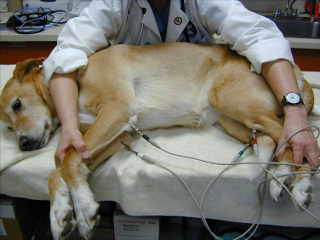
In-House Laboratory
An important part of any exam is blood testing or “screening” and lab work including fecal tests and urinalysis. Plattsburgh Animal Hospital has an on-site laboratory capable of performing most testing, panels, and chemistries your pet may need, such as pre-anesthetic blood work. This saves time, money, and most importantly, you don’t have to wait for results—meaning should a health issue needing treatment to be diagnosed, needed treatment can begin right away.
Performing preventive medicine as well as diagnosing emergent internal health issues requires the ability to perform a wide range of laboratory tests on blood, urine, feces, and biopsied tissue. Without timely access to precise laboratory test results—blood testing, biopsies, microscopic examinations, bacterial culture sensitivity, and more — it is difficult to make an accurate diagnosis or assessment of your pet’s health at Plattsburgh Animal Hospital, we have a complete in-house laboratory. In many cases, our sophisticated instruments and diagnostic capabilities allow us to receive results within minutes. 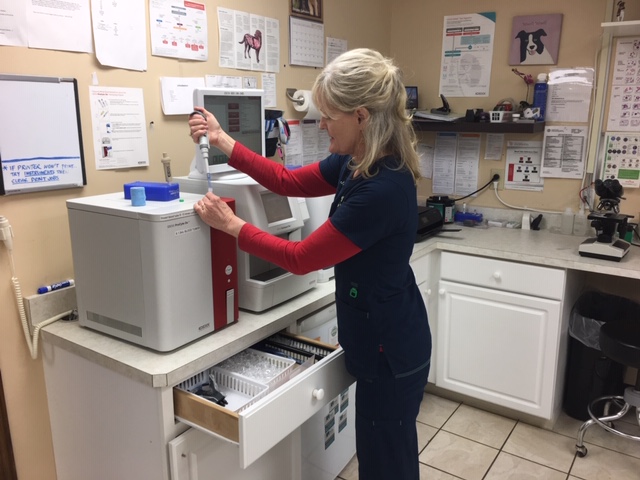
Laboratory testing allows our veterinarians to obtain additional information to assess your pet’s overall systemic health without the need for invasive and expensive procedures. This is why we maintain an advanced in-house laboratory and regularly perform tests during your pet’s wellness exams or when we suspect your pet may have a health issue.
For example, diagnostic testing can detect heartworm disease, Lyme disease, infections, feline leukemia, intestinal parasites, urinary tract infections, and many additional conditions that can go unnoticed in their early stages. Early blood testing can show evidence of disease such as diabetes, changes in liver or kidney function, or simply provide a baseline for future reference. Diagnostic testing is also included in pre-anesthetic screenings prior to dental or surgical procedures that require general anesthesia. Annual wellness blood and urine tests, along with other diagnostics, assist us in the early detection of diseases and health conditions.


